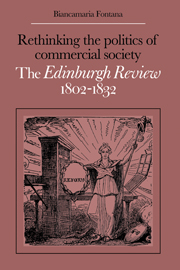Book contents
- Frontmatter
- Contents
- Preface
- Introduction
- 1 Scottish theories of commercial society and the French revolution
- 2 Adam Smith's heritage: the Edinburgh reviewers and the Wealth of Nations
- 3 The definition of political economy: political economy as a social science
- 4 The Edinburgh reviewers and the Whig party
- 5 Commercial society and its enemies: the debate on the First Reform Bill
- Conclusion
- Notes
- Bibliography
- Index
2 - Adam Smith's heritage: the Edinburgh reviewers and the Wealth of Nations
Published online by Cambridge University Press: 14 January 2010
- Frontmatter
- Contents
- Preface
- Introduction
- 1 Scottish theories of commercial society and the French revolution
- 2 Adam Smith's heritage: the Edinburgh reviewers and the Wealth of Nations
- 3 The definition of political economy: political economy as a social science
- 4 The Edinburgh reviewers and the Whig party
- 5 Commercial society and its enemies: the debate on the First Reform Bill
- Conclusion
- Notes
- Bibliography
- Index
Summary
The reviewers, Smith and the Physiocrats
In the previous chapter we have discussed the impact of the French revolution and the war on the reviewers' understanding of political science at large. The next topic which it is necessary to consider is the development – throughout the war period – of political economy in the more restrictive sense of the ‘science of wealth’.
To what extent did the events of the years 1790 to 1815 affect, in the reviewers' eyes, the validity of the doctrines outlined in Adam Smith's Wealth of Nations? Whether it is in fact legitimate to isolate ‘political economy’ proper from the context of the Scottish science of politics at large is obviously a controversial issue, which must be discussed later (see Chapter 3). For the moment it will be convenient simply to assume, uncritically, that the reviewers on the whole regarded political economy as a self-contained body of doctrines, and to concentrate essentially on the content of the doctrines themselves.
The focus on Smith's Wealth of Nations also needs to be qualified. Dugald Stewart's course of lectures on political economy, which he began in 1799 and taught until his retirement in 1809, was not simply an exposition of Smith's doctrine. It included a rich and diversified presentation of a wide range of British and Continental works on the subject of political economy and on the theory of legislation. Among them, the writings of the French Economists were accorded at least as much importance and attention as the works of Smith himself.
But it was the Wealth of Nations that provided the overall structure of the lectures, which were presented in fact by Stewart as a critical commentary upon Smith.
- Type
- Chapter
- Information
- Rethinking the Politics of Commercial SocietyThe Edinburgh Review 1802–1832, pp. 46 - 78Publisher: Cambridge University PressPrint publication year: 1985



